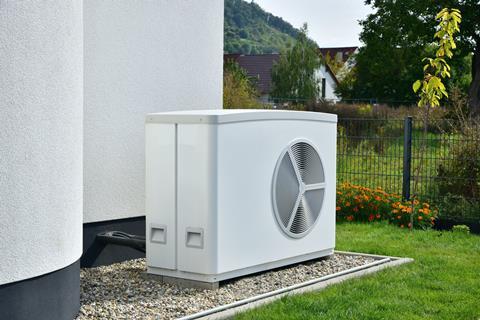Climate Change Committee says government is now “significantly off track” its heat pump targets
The UK has one of the lowest rates of heat pump installation in Europe despite a government pledge to make the country a world leader in the market.
A government watchdog found the UK installed the least amount of heat pumps per capita on a list of 21 neighbouring countries in 2021 and was 11th out of 21st for the total volume of installations.
The latest annual report by the Climate Change Committee (CCC) said heat pump installations in the UK were “well below” its forecasted pathway for hitting the government’s net zero targets, which include reducing carbon emissions by 68% by 2030 compared to 1990 levels.
Finland topped the list with more than 20,000 installations per million of population, followed by Norway, Estonia and Sweden.

France’s installations were above 5,000 per million, while Germany’s were around 2,000. The UK’s installations per million stood at less than 1,000.
Around 72,000 heat pumps were installed in 2022, 69,000 of which were in homes, compared to the 130,000 installations projected by the CCC’s pathway.
The government has said it is “firmly committed to making the UK one of the largest markets in the world for heat pumps” and has set a target to install 600,000 heat pumps a year by 2028.
The report follows sharp rises in the cost of heat pump installation, which increased by 10.3% in 2020 and 19.2% in 2021. Labour costs also rose during the period by 13.7% and 17.8% respectively.
While installation costs fell by 1.9% in 2022, and unit costs dropped by 6.7%, system component prices rose by 4.9% and labour costs edged up further by 0.7%.
The watchdog also said the number of trained heat pump installers is “significantly off track” compared to its recommendation, suggesting that supply chains and workforce upskilling is not scaling up at the rates required to meet government targets.
The slow progress in the growth of the domestic heat pump market was one of several factors which the CCC said were eating away at the UK’s leadership on net zero.
CCC chairman John Gummer said the government’s commitment to act on climate pledges had “waned” since the UK’s presidency of the COP26 climate conference in 2021.
Gummer said ministers had shown “hesitancy to commit fully” to key pledges made at the summit, adding that the CCC’s confidence in the achievement of the 2030 target had “markedly declined” in the last year.
“I urge government to find the courage to place climate change once again at the heart of its leadership. It would be a terrible error if we in Britain hesitate just as the rest of the world wakes up to the opportunity of Net Zero,” he said.
COP26 chairman and former business secretary Alok Sharma told the BBC the UK was at risk of losing its “international reputation and influence on climate”.
“Resting on our laurels is definitely not the answer industry is seeking,” he said.
The UK Green Building Council called the report a “deeply troubling assessment”. The organisation’s deputy chief executive Simon McWhirter said the UK’s low ranking for heat pump installations showed how “severely off-track” the government was on its net zero progress.
“The time window is closing rapidly and the UK needs a step-change in direct investment and policies that will enable home insulation and the switch to electric heating at pace and scale,” McWhirter said.
A government spokesperson insisted the UK was still a world leader on net zero and could be “proud” of its track record.
“We are going far beyond other countries and delivering tangible progress whilst bringing down energy bills with hundreds of pounds coming off bills from next month,” he said.
“The UK is cutting emissions faster than any other G7 country and attracted billions of investment into renewables, which now account for 40% of our electricity.
“In the last year alone, we have confirmed the first state backing of a nuclear project in over 30 years and invested billions to kickstart new industries like carbon capture and floating offshore wind.
“With a new department dedicated to delivering net zero and energy security, we are driving economic growth, creating jobs, bringing down energy bills, and reducing our dependence on imported fossil fuels.”
Two industry groups have been set up in recent months to fill gaps in the government commitments to improving energy efficiency in buildings.
In May, the National Home Decarbonisation Group was set up by firms including Mace and Vinci with the aim to advise on retrofit policy and stimulate innovation.
Earlier this month two co-chairs were appointed to lead the new National Retrofit Hub, a body formed by around 40 industry groups including the Federation of Master Builders and sponsored by government agency Innovate UK.


























No comments yet